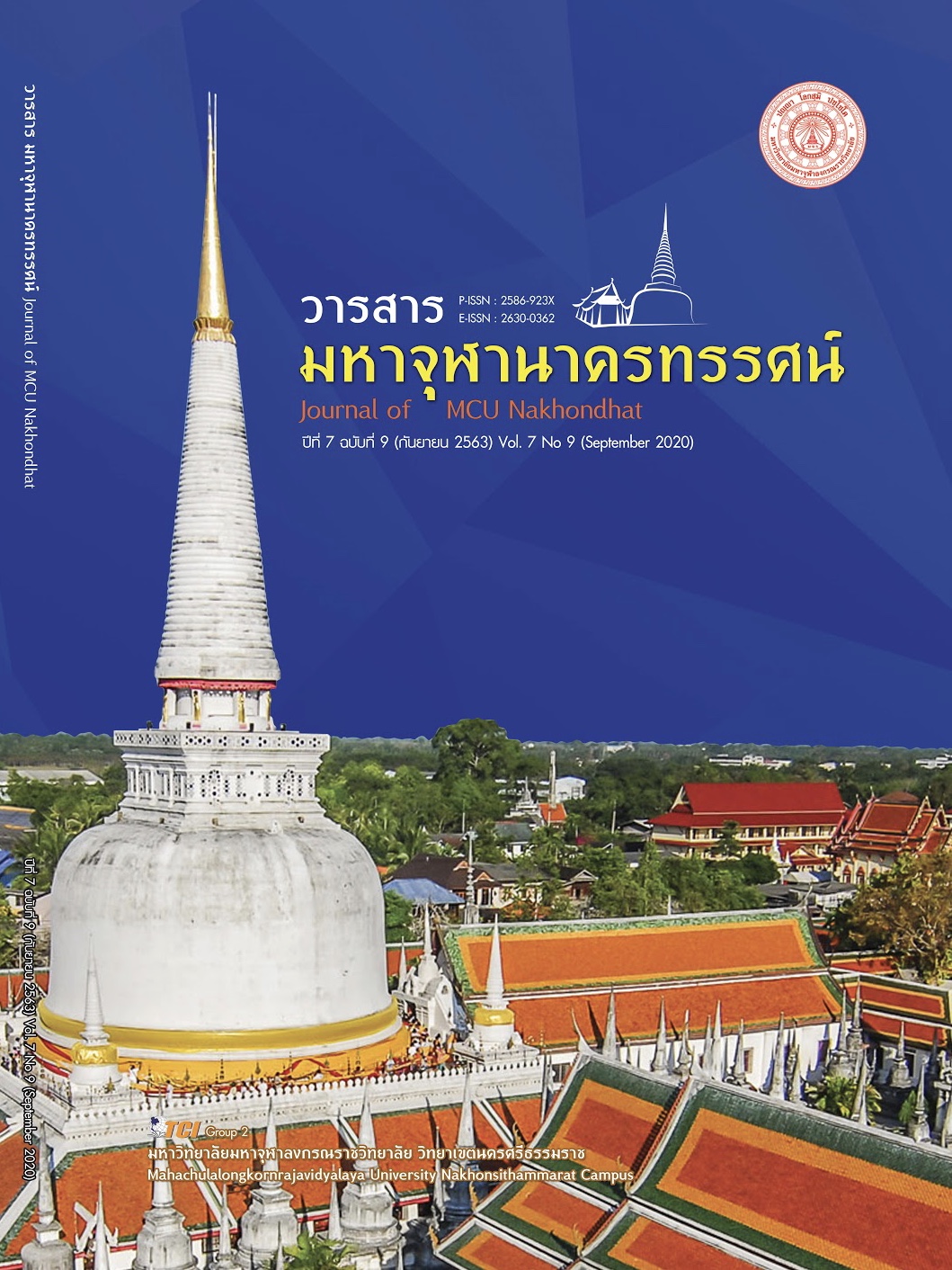A DEVELOPMENT OF LEARNING ACTIVITY BASED ON PROBLEM BASED LEARNING COOPERATED WITH COLLABORATIVE LEARNING APPROACH FOR PROMOTING PROBLEM SOLVING COMPETENCY OF MATTHAYOMSUKSA 4 STUDENTS
Main Article Content
Abstract
The article of this research were to study the effect of using a development of learning activity based on problem – based learning cooperated with collaborative learning approach of Matthayomsuksa 4/1 Students by considering in 1) to investigate the efficiency of learning activity based on problem – based learning cooperated with collaborative learning approach to meet the 75/75 criterion of efficiency, 2) to examine the effectiveness index (E.I.) of learning activity based on problem – based learning cooperated with collaborative learning approach, and 3) to study the collaborative problem solving competency of the students who learned with learning activity based on problem – bassed learning cooperated with collaborative learning approach. The sample consisted of 35 Matthayomsuksa 4/1 students in the second semester of academic year 2019 from Borabu School, Borabu, Mahasarakram. The sample was recruited by a cluster random sampling technique. The research instruments employed in this study were as follows: 1) seven lesson plans of problem – based learning cooperated with collaborative learning approach, 2) the collaborative problem – solving competency test, and 3) the achievement tests. The data was analysed by using mean, percentage, standard deviation, the efficiency, and effectiveness index (E.I.). The findings of this study were described as follows: 1) the efficiency of learning activity based on problem – based learning cooperated with collaborative learning approach was 77.27/85.43, 2) the effectiveness index (E.I.) of learning activity based on problem – based learning cooperated with collaborative learning approach was 0.7500 3) the mean score of the students' competence on collaborative problem solving was 38.91 out of 48 points. It showed that students were at the highest level of collaborative problem – solving competency.
Article Details
References
กิดานันท์ มลิทอง. (2548). เทคโนโลยีการศึกษาและนวัตกรรม. (พิมพ์ครั้งที่ 1). กรุงเทพมหานคร: อรุณการพิมพ์.
แคทรียา มุขมาลี. (2557). การพัฒนาความสามารถในการแก้ปัญหาและผลสัมฤทธิ์ทางการเรียน วิชา วิทยาศาสตร์ เรื่อง อาหารกับการดำรงชีวิตของนักเรียนชั้นมัธยมศึกษาปีที่ 2 โดยใช้การจัดกิจกรรมการเรียนรู้แบบใช้ปัญหาเป็นฐาน. ใน วิทยานิพนธ์ศึกษาศาสตรมหาบัณฑิต สาขาวิทยาศาสตร์ศึกษา. มหาวิทยาลัยขอนแก่น.
ดวงมาลา จาริชานนท์. (2551). การพัฒนาแผนการจัดกิจกรรมการเรียนรู้การอ่านเพื่อฝึกการคิดวิเคราะห์ด้วยแบบฝึกทักษะสำหรับชันมัธยมศึกษาปีที่ 1. ใน วิทยานิพนธ์การศึกษามหาบัณฑิต สาขาวิชาการบริหารการศึกษา. มหาวิทยาลัยมหาสารคาม.
ตวงรัตน์ ศรีวงษ์คล. (2550). การเรียนการสอนโดยเน้นผู้เรียนเป็นสำคัญกับกิจกรรมออนไลน์แบบ WebQuest. วารสารพัฒนาเทคนิคศึกษา, 19(62), 35-69.
บุญชม ศรีสะอาด. (2545). การวิจัยเบื้องต้น. (พิมพ์ครั้งที่ 7). กรุงเทพมหานคร: สุวีริยาสาส์น.
ปราณี ที่บแก้ว. (2552). การพัฒนาความสามารถในการแก้ปัญหาและผลสัมฤทธิ์ทางการเรียนวิทยาศาสตร์ เรื่อง ทรัพยากรและสิ่งแวดล้อม ของนักเรียนชั้นมัธยม ศึกษาปีที่ 3 โดยการจัด กิจกรรมการเรียนแบบใช้ปัญหาเป็นฐาน. ใน วิทยานิพนธ์ศึกษาศาสตรมหาบัณฑิต สาขาวิชาหลักสูตรและการสอน. มหาวิทยาลัยขอนแก่น.
พลศักดิ์ แสงพรมศรี. (2558). การเปรียบเทียบผลสัมฤทธิ์ทางการเรียนทักษะกระบวนการทางวิทยาศาสตร์ขั้นสูง และเจตคติต่อการเรียนเคมีของนักเรียนชั้นมัธยมศึกษาปีที่ 5 ที่ได้รับการจัดการเรียนรู้สะเต็มศึกษากับแบบปกติ. วารสารศึกษาศาสตร์ มหาวิทยาลัยมหาสารคาม, 9(ฉบับพิเศษ), 401-418.
พวงรัตน์ บุญญานุรักษ์. (2544). การเรียนรู้โดยใช้ปัญหา PROBLEM – BASED LEARNING. ชลบุรี: มหาวิทยาลัยบูรพา.
วรางคณา ทองนพคุณ. (2554). ทักษะเพื่อการดำรงชีวิตในศตวรรษที่ 21 ความท้าทายในอนาคต (21" century skills: The Challenges Ahead). ภูเก็ต: มหาวิทยาลัยราชภัฏภูเก็ต.
สถาบันส่งเสริมการสอนวิทยาศาสตร์และเทคโนโลยี. (2557). โครงการประเมินผลนักเรียนร่วมกับ นานาชาติ. เรียกใช้เมื่อ 15 มิถุนายน 2561 จาก http://pisathailand.ipst. ac.th
สารีพันธุ์ ศุภวรรณ. (2545). การพัฒนาโปรแกรมการศึกษานอกโรงเรียนตามแนวคิดการเรียนรู้แบบร่วมกันเพื่อพัฒนาทักษะการแก้ปัญหาของเด็กเร่ร่อน. ใน ดุษฎีนิพนธ์ศึกษาศาสตรดุษฎีบัณฑิต สาขาวิชาการศึกษานอกระบบโรงเรียน. จุฬาลงกรณ์มหาวิทยาลัย.
อรนุช ศรีสะอาด. (2550). การวัดและประเมินผลการศึกษา. (พิมพ์ครั้งที่ 2). กาฬสินธุ์: ประสานการพิมพ์.
Antonenko et al. (2014). Fostering collaborative problem solving and 21st century skills using the DEEPER scaffolding framework. Journal of college science teaching, 43(6), 78-87.
Bulu, S. T. & Yildirim, Z. (2008). Communication Behaviours and Trust in Collaborative Online Teams. Educational Technology & Society, 11(1), 132-147.
Care & Griffin, P. (2014). An approach to assessment of collaborative problem solving. Research and Practice in Technology Enhanced Learning, 9(3), 367-388.
Gallagher, S. A. (1997). Problem Based Learning: Where Did It Come from, What Does It Do, and Where Is It Going. Journal for the Education of the Gifted, 20(4), 332-362.
Hilton and Rapporteur. (2010). Exploring the intersection of science education and 21 Century skills: A workshop Summary. Retrieved May 23, 2019, from
http://www.csinet.org/wp-content/uploads/2013/07/%09Intersection-of-Science-Education-and-21st-Century-Skills.pdf
Karel et al. (2005). Measuring perceived sociability of computer – supported collaborative learning environments. Computers & Education, 49(2), 176-192.
OECD. (2013). Draft collaborative problem – solving framework. Retrieved May 20, 2019, from http://www.oecd.org/pisa/pisaproducts/pisa2015draftframeworks.htm
Partnership for 21st Century Skills. (2010). Frameworkdefinitions. Retrieved June 9, 2019, from http://www.p21.org/documents/P21 – FrameworkDefinitions. Pdf
York University. (2003). Collaborative Learning. Retrieved July 9, 2019, from http://www.yorku.ca/academicintegrity/collaborative1.html


